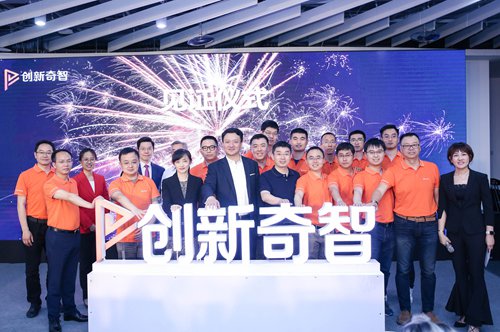
Photo: Courtesy of Sinovation Ventures
Kai-fu Lee's venture capital firm Sinovation Ventures on Tuesday announced a new artificial intelligence (AI) subsidiary. But the former Google China president's new offshoot, essentially a business model innovation that could step up China's ambitions for AI dominance, still needs to be justified in terms of its commercial viability.
Unlike most of the Chinese firms delivering AI-powered products and solutions, the new subsidiary, called Chuangxin Qizhi, sees itself as a kind of AI-driven consultancy that customizes road maps for traditional businesses to incorporate the technology. It's an increasingly popular business model.
Having raised an angel round of more than 100 million yuan ($15.7 million) from Chengwei Ventures and Sinovation Ventures, among other investors, Chuangxin Qizhi aims to remodel businesses initially in the fields of retail, manufacturing and insurance.
The new venture is Lee's latest attempt to explore AI opportunities in the innovation-oriented economy, and it exemplifies China's leading position in terms of AI applications. It could help drive further AI use in many of the country's traditional sectors, considering its offering of customized insights and advice as well as the technological expertise needed to increase productivity and align with the intelligence era.
The US arguably remains top dog in terms of cutting-edge AI technologies, but the prevalence of digitalized everything in China has paved the way for China's rise as the global hub for AI applications. That's why China has become the most favored market for AI investment. According to statistics from US-based venture capital database CB Insights, a total of $15.2 billion was invested in AI across the globe in 2017, with Chinese companies collecting 48 percent of the total and US firms attracting 38 percent.
The investment fever is certainly adding fuel to China's efforts to incorporate AI technologies more widely into traditional areas of the economy. And Lee's new AI venture appears to indicate that the massive investment is translating into an increasingly sophisticated approach.
An essential issue, however, is whether the new AI firm will be genuinely viable in commercial terms. When asked about how this kind of consultancy business makes money, Jenny Wang, a former director at Google and COO of Chuangxin Qizhi, told the Global Times on Tuesday that its revenues come from the development and manufacturing of AI-enabled products tailored to individualized needs or the sharing of an improvement in profits that clients make after applying AI-based solutions customized by the venture.
That makes business sense, but it hardly sets the company apart from many other firms providing industry-focused solutions for adopting AI technologies. The venture could offer some fresh ideas, but for it to prove commercially successful, efforts will be required to go the extra mile.
The author is a reporter with the Global Times. bizopinion@globaltimes.com.cn

